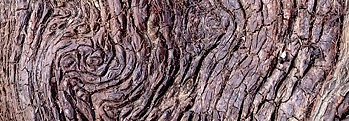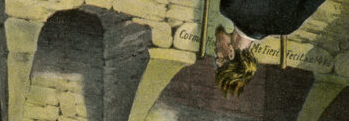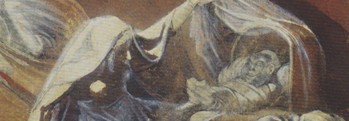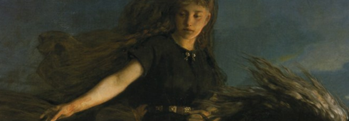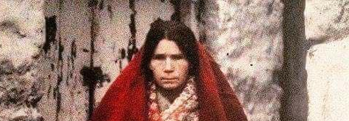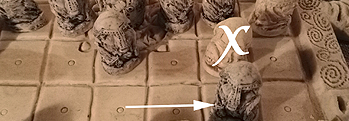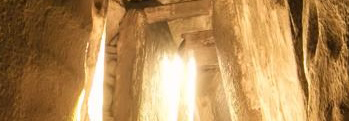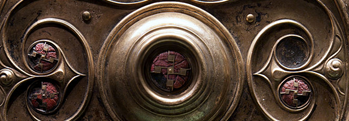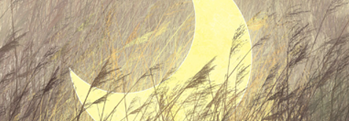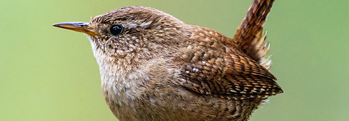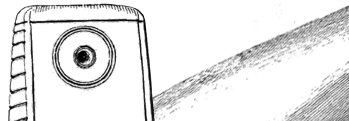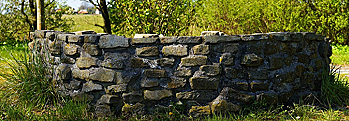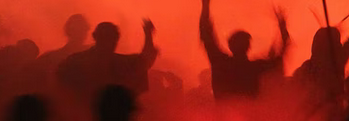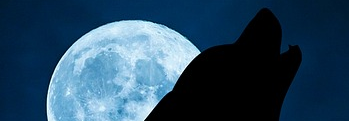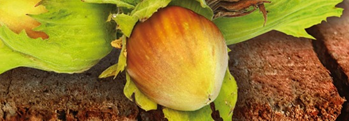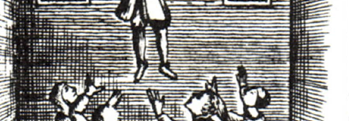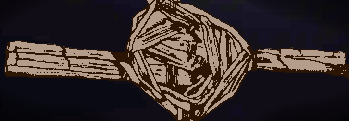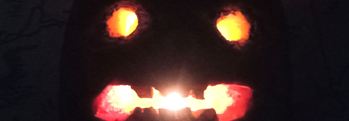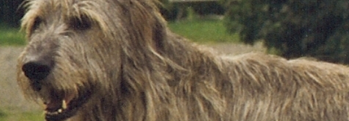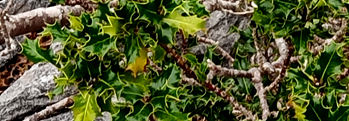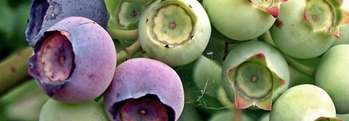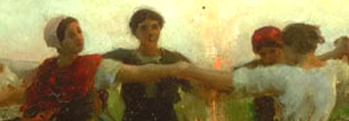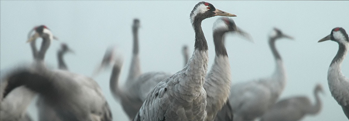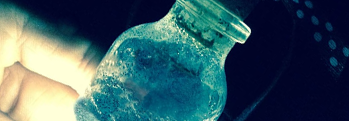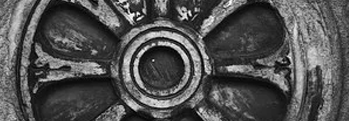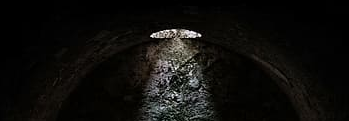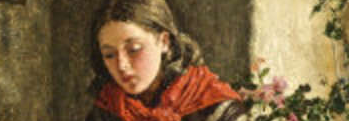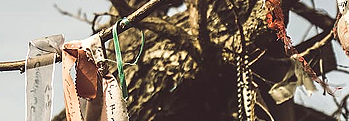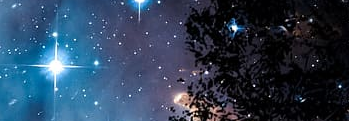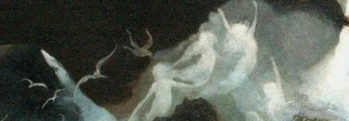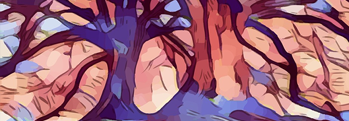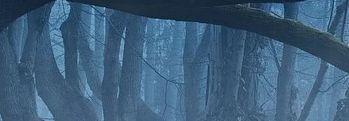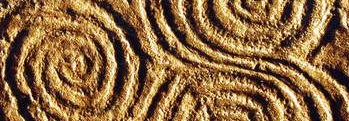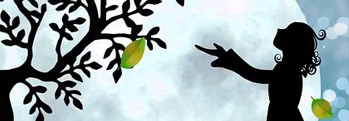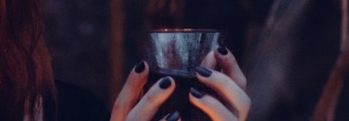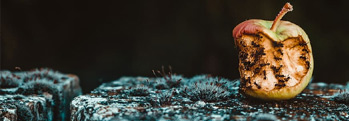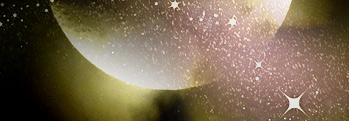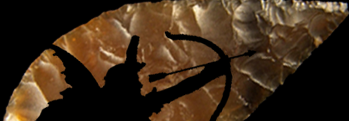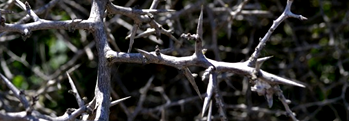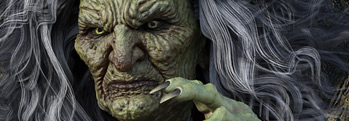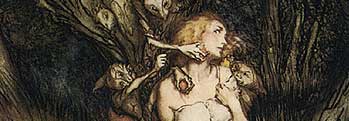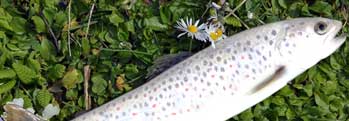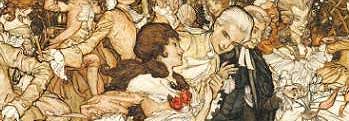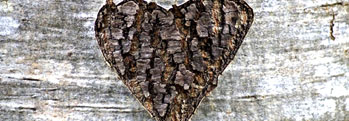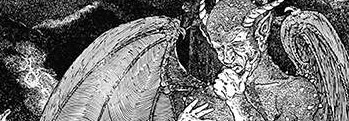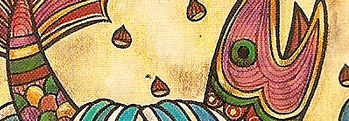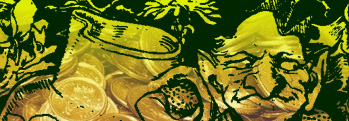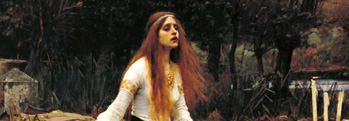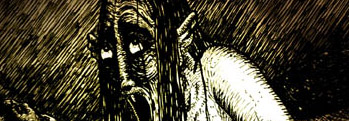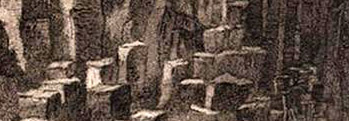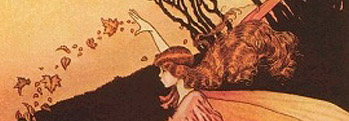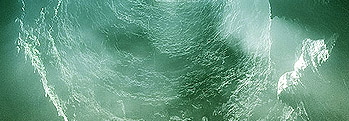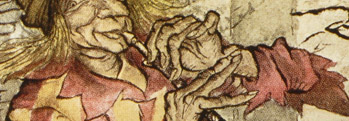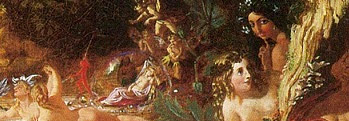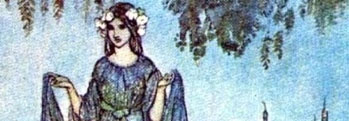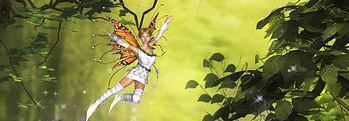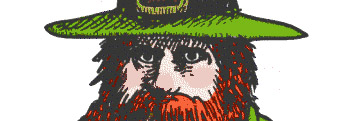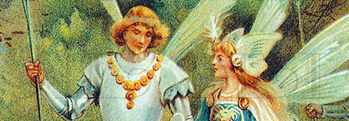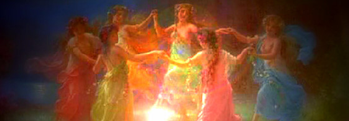The Hunchback of Knockgrafton
Irish and Celtic myths and legends, Irish folklore and Irish fairy tales tales of Ireland
It pays to be kind in The Hunchback of Knockgrafton
The children of De Danann once ruled the island of Ireland, before they departed back to their own lands in the farthest west or went below the earth in their fairy mounds to dance and sing forevermore, but if you're lucky – or unlucky! – you might still come across them in the wild places and those deep forests yet untouched.
And so it was with the man called Lusmore, a poor hunchback who lived in the shadow of the Galtee mountains, in the green glen of Aherlow. He was called Lusmore as a kind of nickname you see, for that means foxglove in the old language and he'd always wear a sprig of it in his hat. It was a flower long known to be a favourite of the fairy folk and had little enough to do with foxes, for foxes don't have hands and so gloves aren't of much use to them. The fairies found a use for them though, and that was atop their heads as caps.
He was known around and about for his crafty ways with herbs and skilful weaving of straw and rushes, which was at the time a talent much more useful than it is today, good for making hats and baskets, even to telling stories in the design of them. Charms he could weave which would help the harvest, or fend off dark spirits on Samhain, or could be given to the ocean for good fishing.
 It is well that you had to bend over for the weaving, for his back was so humped that he couldn't stand up straight! Not only that but it looked as though his body had been rolled up in a ball and stuck to his shoulders, and when he sat himself down his chin would almost touch his knees. As is always the way, people with too much time on their hands gossiped about him and rumoured he was up to no good, but in truth he was a kindly sort of fellow given to walking alone in the wilderness looking for herbs.
It is well that you had to bend over for the weaving, for his back was so humped that he couldn't stand up straight! Not only that but it looked as though his body had been rolled up in a ball and stuck to his shoulders, and when he sat himself down his chin would almost touch his knees. As is always the way, people with too much time on their hands gossiped about him and rumoured he was up to no good, but in truth he was a kindly sort of fellow given to walking alone in the wilderness looking for herbs.
He was doing just that one evening as he strolled from Cahir to Cappagh, but he'd left it later than he should have and his pace was not quick, so he sat himself down for a rest by the mound of Knockgrafton after the sun had set. The mounds were known to be places of the fairy folk but Lusmore wasn't overly bothered by that, since he meant harm to nobody fair or otherwise.
As he stretched his weary bones the moon rose above him, and he fancied he heard unearthly music from somewhere – not here, not there, but below him! Pressing his ear to the ground with some discomfort, his mouth opened as beautiful, eldritch melodies rose and made the grasses shiver.
Many voices sang in perfect harmony, rising and falling and swaying and leaping, singing only two words, over and over:
Dé Luain, Dé Máirt
Dé Luain, Dé Máirt
Dé Luain, Dé Máirt
Which means, Monday, Tuesday. Again and again they sang these words, then stopped, and Lusmore was saddened for although the song itself was simple, the music it was sung to captivated his spirit. After a while though, he felt that he could perhaps add a little to it and help make it richer yet.
So when the voices sang
Dé Luain, Dé Máirt
Dé Luain, Dé Máirt
Dé Luain, Dé Máirt
He added “Agus Dé Céadaoin” along with the tune and beat of the music, which means Wednesday.
He thought to himself that this would be the perfect addition, since of course Wednesday follows Monday and Tuesday, but the music below suddenly stopped dead with the beat of a single drum.
While he held his breath in fright, suddenly aware of what he'd done, below him the fairies held a great conference among themselves, for this was something new to them. The song they'd sung was one of their ancient tunes, and had been the same since they'd first gone down into the mounds, but they quickly agreed that it was made all the better by Lusmore's contribution!
They decided to welcome this master musician into their midst, and reached up from the mound to take him down into their Otherworld. With that, Lusmore felt himself grabbed by many hands and spun around and around as though in a great wind, and into the dark earth as if it were no more than smoke.
The fair folk weren't one bit concerned about his appearance, and plied him with rich meads and rare delicacies, singing and dancing around him in circles, celebrating him as though he were one of their own maestros. As happy as he was with this, in contrast to the way his own people had treated him, he soon spotted nearby a large group of fairies talking urgently with one another near to where he sat.
As one, they spun and faced him, pointing their fingers, and as one they sang:
Lusmore! Lusmore!
Doubt not, nor deplore,
For the hump which you bore
On your back is no more!
Look down on the floor,
And see it, Lusmore!
Astonished, Lusmore watched the great weight he'd borne since a child topple from his shoulders and fall to the ground. Incredibly, he felt himself stretch and stand tall and straight, and he wept with wonder to feel his head brush the roof of the fairy hall. For he was, without the hump, a fine and handsome man!
His head spun and presently he fell asleep among the fairies, awakening covered in dew outside the mound among the cattle and sheep having their breakfast. The morning sun shone down on him warmly and nearly he regretted awakening, so wonderful had been his dream the previous night.
Or had it been a dream? He reached behind himself to find – the hump was gone from him! He leapt to his feet and danced the first jig he'd ever danced, raising the praises of the fairy folk to the high skies above. And not alone had they taken his hump but given him a fine new set of clothes to boot, which was as well for his old ones no longer fit.
From that day forward nobody knew him until he said his name, and they laughed at his tale although they couldn't deny he was much changed.
He went back to his life, weaving rushes and selling herbs, happy as a man could be, when one morning a woman knocked at his door. She asked him could he direct her to Cappagh, and he said he could not, for she was already in Cappagh. Then she asked him for the way to the house of Lusmore, and he told her she was already there.
"I have come," said the woman, "out of Decie's country, in the county of Waterford looking after one Lusmore, who, I have heard tell, had his hump taken off by the fairies. For there is a son of a gossip of mine who has got a hump on him that will be his death, and maybe if he could use the same charm as Lusmore, the hump may be taken off him. And now I have told you the reason of my coming so far. 'Tis to find out about this charm, if I can."
Well Lusmore who hadn't a bad bone in him truth be told, shared his story with the woman, and she thanked him and bid him good day, happy and hopeful for the cure that was in it.
When she got back as far as Waterford she told the humpbacked man there everything she had heard, and he got up in a little cart and made his way with all haste to the mound of Knockgrafton. It was a bit of a journey but he didn't mind as long as he was cured.
Now this man's name was Jack Madden, and he was of a very different character to Lusmore, known to be peevish and and cunning, impatient and prone to bad habits, although I suppose much could be forgiven as his life had been so marked.
But I'll tell you this – the fairies aren't forgiving sorts!
When Jack Madden heard the music start to rise, he was moved not at all for his heart was as hard as stone, and he was impatient to be rid of his hump. So when the words were scarce sung, he bawled out straight away
“Agus Déardaoin, Agus Dé hAoine!”
Which means, “and Thursday, and Friday,” for in his low craftiness and greed he thought he'd get two nice suits instead of just the one as well as his hump removed, for adding two words.
Well the music stopped alright, and the fairy host emerged, screeching and bellowing, demanding to know who had spoiled their lovely song! In their wrath they found Jack Madden awaiting his prize, so they thought they'd give him what he was asking for, instead of what he'd asked for, if you follow my meaning.
Jack Madden! Jack Madden!
Your words came so crass in
the song we felt glad in
Your life we will sadden
Here's two humps for you, Jack Madden!
Two dozen of their strongest held him down while the others got Lusmore's hump, which had been stored for reasons best known to themselves, and roughly jammed it down on Jack Madden's shoulders, kicking him off the mound after.
When the others came to find him in the morning, expecting to see a straightened man with a new suit, instead they found a man half-dead with a hump almost the size of the mound! Back home they went, downcast and horrified, carrying him between them, and their gossip told of the dangers of trifling with fairy gifts from that day on.
The fairy mound can be found, if you've a mind to find it, on the map below.
Further Folk and Faerie Tales of Ireland
A beautiful new font has been developed which allows you to type in Ogham on your computer! Dustin A. Ashley in association with Dr. Adam Dahmer are pushing the boundaries of Gaelic culture outwards into new and exciting territory, read on to learn more: "Within Gaelic culture, there is a long-standing tradition where lang ... [more]
One of the rarest and most beautiful woods in the world is Irish bog oak. This very ancient kind of wood can be found across Ireland, but is most often recovered from deep peat bogs in the midlands, and can be anywhere from three thousand to eight thousand years old or more. These trees grew, lived and fell in times of legend, witnessing the rise o ... [more]
The gift of the gab, as it’s known, is a common thing among the Irish – being able to talk all day about anything and everything, and do it in a way that would have you listen as well. It’s as Irish as red hair and freckles. But what if you didn’t have the gift of the gab, or felt a deficiency of gabbiness? Never fear, al ... [more]
Once upon a time in County Kerry, there lived a wealthy farmer and his wife, blessed in every way with the exception of only one – they had no children. They put a brave face on it, but with every year passing they grew older and their hopes grew colder, although the ember never quite faded. So you can imagine their delight when finally, a ... [more]
Michael O’Guggin from Cahir Cam was the only son of a small farmer in County Cork, and his family loved him well, so to keep him from getting on the boat to America with all of his friends, they signed over the farm to him and married him to a lovely girl at what we would consider a very young age these days, And yet although he had grown ... [more]
Long ago in the Eyeries in County Cork, there lived a wise woman by the name of Máire Ní Mhurchú, which was Mary Murphy in English. Now when I say a wise woman, I don’t mean she was a woman wise in old sayings and folksy ways – although she had no shortage of those either – I mean she was a bean feasa, one of ... [more]
We are delighted to be able to present to you the rules of Fidchell, the Irish game of kings! This game can be purchased, but it's easy to get started and try it out for yourself. All you need is a 7 x 7 board, which can be squares or pins marked out - even on paper - 16 white or attacker pieces, a king piece, and 8 darker-coloured defender pie ... [more]
The Autumn equinox was considered to be a day of great importance by the ancient Irish, especially for the first farmers who arrived and built the great megalithic civilisation. Numerous ancient monuments are aligned to both the spring and Autumn equinoxes, such as those at Loughcrew, and we can easily imagine ancient druids or magicians enacti ... [more]
The Spring equinox was a very important time for the people of ancient Ireland, heralding as it did the end of the dark season with all of its dangers and want, and signalling the dawn of a new year of plenty. The day and night, the light and the dark side of the year were in equal balance, neither stronger than the other, and it is easy to ... [more]
The winter solstice is the shortest day of the year, and the people of old Ireland called it Grianstad, or the day of the stopped sun. The solstice festival and celebrations date back at least six thousand years, but may go even further back - we can guess their age for them because many of the megaliths constructed by the Neolithic Irish are a ... [more]
War and the arts of war much occupied the people of Ireland, who became renowned for their skill with weapons and in the ways of battle. They fought one another and the many invaders who came to this land, earning not only fame for their arms and the swords and spears they carried, but for their shields as well! Some of the most legended shields ... [more]
There was never much call for police back in the old days in Ireland – everyone knew everyone else in the area and everyone knew what everyone else had done! While there were ups and downs to it, if someone was caught doing something particularly bad, they would be ashamed to meet anyone’s eye, and would eventually leave the area, head ... [more]
Our Irish ancestors from olden times were fascinated with the sky and its inhabitants, how they moved, what they meant and where their celestial lives intersected with our own. The Tuatha Dé Danann loved the sun foremost but others built places aligned to the movements of the moon and stars, many of which predate the solar structures. The ... [more]
From the earliest times in Ireland the tiny native wren has been regarded with respect as the wisest bird of all, who outsmarted the eagle to become the king of the birds of Ireland. Indeed some believe that its name in Irish, dreoilín, means trickster. The craftiness of this little bird was how it got its crown, for the king of all the b ... [more]
The Stonemen of Ireland were once a great tradition throughout the country, a tradition that reached back to the earliest antiquity of the nation. And yet if you ask what a Stoneman might be today, very few if any will be able to give you the answer! It might be found yet in the Aran Islands in the furthest west, but not many other places. Mille ... [more]
The tying of elaborate knots to bind a wish or curse is an ancient practise in Ireland. The followers of Manannan, lord of the waters, were reputed to tie reeds into eldritch shapes and cast them into bogs as an offering. Different knots had different spiritual meanings, as with the St Bridgit’s cross, rushes woven into a Christian icon. Our ... [more]
Long ago in Ireland, although not so long that a wide oak might not remember, there lived in county Roscommon a farmer by the name of Donal O’Leary. Now Donal was known far and wide as a crafty fellow, or cute as we say in Ireland, and a skilled hand with the cards to boot, but he made one mistake – he played cards with the two farmers ... [more]
The mightiest heroes and warriors of ancient Ireland understood well that the greater part of battles were fought in the hearts and minds of men and women. A tired and bloodied warrior may fight like a cornered wolf if his courage is up, while a well fed and rested champion may sag in dismay at the touch of fearful sorrow. This was a different m ... [more]
A king in Ireland asked his daughters whom they wanted to marry. The oldest wanted the king of Ulster, the second the king of Munster, and the youngest the Brown Bear of Norway. That night, the youngest princess woke to find herself in a grand hall, and a handsome prince on his knees before her, asking her to marry him. They were married at once ... [more]
The fairy tales and legends of Ireland are bound into her very soil and seed, and few more so than the humble ragwort, the Buachalán Buíde! This plant was known as the fairy horse, and little children were warned not to touch it for fear they would be spirited away by the fairies on their yellow horses. Stories were told up and ... [more]
Hares in Ireland have long been seen as mysterious creatures, deeply connected to the otherworld and the subject of legend, song and story. Their association with the realms of the fairies and good folk led the old Druids to capture and release them in a place with many openings, such as a stone circle, to see which way they would run. Then the Dru ... [more]
Once in Ireland, somewhere around the south and east of the country near the old kingdom of Osraí, there lived a young farmer by the name of Connor. He had a small herd but a good one, of strong stock and unblemished, but one morning he arose from his bed before the dawn, as was his custom, and noticed that two of them were missing! This ... [more]
Hazel trees, or the crann coill, are among the most important trees in Irish mythology and folklore. They are associated with wisdom and authority, and in old English the word "haesl" means "rod of power". The druids would often choose to carry a hazel wand over an oaken staff, and so respected as chieftain trees were they that ... [more]
It took the fancy of one of the gentry, who lived near to the Earl of Orrery’s seat, to play cards with his friends one day, so he sent his butler to purchase a new deck of cards. However as the man passed an old mound he paused in surprise, for what was waiting for him but a table loaded with good cheer and a fine company making merry! Cu ... [more]
You will know the cursed place by these three tokens – an elder tree, a lonesome calling corncrake, and thickets of nettles. Should a traveller see, smell and hear these signs they would know to turn around quick and hurry back the way they had come, before something unpleasant took an interest in them! The Irish made cursing into an art f ... [more]
There is a kind of cross, not unlike the much more famous St Brigid's cross, which can only be made on Hallowe'en or Samhain as it used to be known. It could be hung inside the front door, in the thatch or elsewhere within the house, and it was reputed to offer protection from bad luck, sickness, curses and the fairy folk who might be up to ... [more]
The ancient Irish festival of Samhain, or as we know it today, Hallowe'en, is rooted deep in the very bedrock of Ireland, among the customs of those who first arrived here when the great ice withdrew. On this advent of the darkest time of the year they imagined their worst fears coming true, the dead walking and evil spirits hovering outside th ... [more]
The majestic Irish wolfhound, known as the Cú Faoil in Irish, famed in history and mythology, is one of the largest and strongest dog breeds in the world. It is certainly is one of the tallest, reaching over seven feet in height when standing on its hind legs! As it was known in ancient times, the great Irish hound was held in such high r ... [more]
Of all the many plants trees, shrubs and green growing things in Ireland, there are few as closely woven into Irish mythology as the holly, or Cuileann. It was seen by the old people as one of the noble trees, and it was never cut down completely, although sprigs were often taken for the decoration and protection of homes. Some would ask permission ... [more]
Lughnasa means “the gathering of Lugh” the many-gifted, who was once a leader of the Tuatha Dé Danann. In times we know only from myth and legend, this festival was celebrated for the two weeks leading up to the cross-quarter date, which might have been anywhere from the first to the fourteenth of August, and for two weeks afterw ... [more]
The month of July was known for the past several centuries in Ireland as the hungry month, since that was when the food from last year's harvest began to run out or had spoiled. The ability of the typical Irish household to store food and save money to buy more was at its lowest by the middle of the nineteenth century, even before the great hun ... [more]
Although it is less celebrated these days, the midsummer festival used to be an important occasion in Ireland, going back many centuries, far into ancient times. Even as lately as fifty years ago half the streets in Ireland would have their own bonfire, or more properly bone fire, since the Irish word for “bonfire” is tine cnaimh. The b ... [more]
The crane is one of the largest birds you might encounter, and once it was common throughout Ireland. Sadly cranes left these shores more than three centuries ago, so a nesting pair being spotted recently is cause for celebration! They were making their new home on a rewetted raised peat bog, one of many being returned to the wilderness in Irela ... [more]
Back in the olden days when fairies were more often seen than they are today, whether that was because there were more people in the countryside or there was more countryside, farmer Purcell rented a few acres in Mourne near Mallow in Cork, as his means allowed. Those means didn't allow much, sad to say, for his plot was poor and barren. Lik ... [more]
When the spring turns to summertime in Ireland, a carpet of golden yellow rolls out under drumlin skies across the wild places to greet the changing seasons, the exuberant growth of the gorse, which some call whinn, broom or furze, although in the old language it's known as Aiteann, which means “sharp”. And well named it is, for the ... [more]
May is a magical month in more ways than one! The beginning of May marked one of the cross quarters of the year, when the world grew thin in certain places, as the old folks used to say, and the Sidhe and other spirits could travel over and back between our world and theirs. The exact date wanders from year to year mind you, sometimes earlier, some ... [more]
The author of the Long Black Hand was a man called Richard Cronnolly, born in Ballinderreen County Galway in 1828. He spent his spare time in the record office where he studied old documents. Although he was not a wealthy man and had no help from anyone, he found a publisher just before he died at the very young age of thirty five. The Long Blac ... [more]
Not all that long ago there lived a decent family on the border of Tipperary, Michael Flannagan and Judy his wife were the two that were in it. Although they were not blessed with wealth, they were blessed with children, four sons to be exact. Three of these lads were as fine and stout a trio as you'd ever hope to see, and it was enough to m ... [more]
One of the many ancient Irish traditions whose origin has been lost to the ever-deepening mists of time is that of the wishing tree. They were also called rag trees, raggedy bushes, or clooty or cloughtie trees, and they can often be found growing next to or near holy wells and springs. When people gathered around the old turf fires in Ireland, ... [more]
The Sceach Geal is a tree that grows in Ireland and throughout the north of the world and its name means “bright thorn” or moon thorn. It was known in Brehon law as an Aithig fedo or a Commoner of the Wood, a quickthorn like its ferocious cousin the blackthorn, and it is also called hawthorn, the gentle bush, the lone thorn, the May tre ... [more]
Throughout Ireland can be found many holy wells and blessed springs, most of which predate the arrival of Christianity on the island, but which were consecrated by the Church to the service of Christ. Within some of these wells and deepnesses, the old legends tell, swim sacred guardians and fish of strange repute! To this day the people of Irela ... [more]
Lough Gur is a place of great antiquity and the source of many strange rumours and legends, surrounded by misty forests and low rolling hills, not all of which are natural in origin! Once there was an island in the middle of the lake, but now it is a peninsula, and it is joined to the eastern shore by a causeway, not far from the village of Aney ... [more]
There was a farmer in County Kerry who had a nice little cottage for himself and his wife, but the thatched roof was in a terrible state of disrepair and unlikely to last another winter. Unlike the stone houses and cottages in the west, Kerry cottages were less sturdy, and so he knew he had to build himself another place to live. He searched thr ... [more]
Long ago in Ireland, at the dawn of the Christian age, Irish monasteries and schools were famed throughout Europe and the world for the depth of their knowledge and the quality of the education they gave to princes, lords and nobles who travelled from all parts to attend them. One of the most famous early Christian theologians who taught in thes ... [more]
The people of Ireland before the time of Saint Patrick had many strange customs, and some of these survive even to this very day, often mixed and combined with Christian rites and beliefs! One of those traditions was the sunwise walk. What this meant was, in order for good luck to attend an event, you had to walk around it sunwise or deiseal, pr ... [more]
We have a saying in Ireland, that it's the only place in the world where you can get all four seasons in the one day – well there's truth in that, but Irish weather can be even stranger than most people realise! So it is with the Gaoth Sidhe, which means “the fairy wind,” and is pronounced “gwee sheeha”. Oft ... [more]
One upon a time in Ireland, in the farthest west of County Clare, there lived a brave young chieftain whose name was O'Quinn. A kindly enough man was he, and fair to behold, of ruddy locks and clean limbs, and he made his Dún on a flat plain near to a clearwater spring, the purest in all of Ireland and perhaps all the world. He was co ... [more]
Cursing of various sorts has a history as long and rich as Ireland's own, stretching from the very earliest tales of the first settlers in Ireland all the way to the modern day. Whether a quick muttered malediction on someone who had crossed you or an elaborate, lengthy poem intended to satirise and ruin the legacy of a king, the mallacht, or c ... [more]
Much has been said but little written of the old Irish piseóg, the word of the curse. Now the same term is often used to refer to general traditions and superstitions in Ireland, things like if you're ever lost, turn your socks inside out to find your way home, or opening the back door if you hear a knock at the front door, to let the fa ... [more]
There's a common misconception some might have about fairies, which is the idea that fairies are nice friendly little spirits, trailing pixie dust and turning pumpkins into luxury vehicles. As any of the old folk of Ireland could tell you, nothing could be further from the truth, for a fairy in wrath is more dangerous than a hive of wasps or a ... [more]
Sometimes when out and about travelling the lesser known byways of Ireland, you might come across a little stone arrowhead or piece of flint shaped by hands long gone, and people would tell you not to touch it for fear it might carry the tinneas sióg, the sickness of the fairy mounds! For it was that fairies, the sidhe, were known to hurl ... [more]
The sinister crone of the woods, the wishing thorn, there are as many tales told of the blackthorn trees of Ireland as there are spiky thorns on its branches. The people who came before, whose blood still runs in some, planted them around their tombs and sacred places and bound the lunantisidhe, or moon fairies to protect them, save only on the ful ... [more]
Once upon a time there was a poor woman with three daughters, and one day the eldest decided to seek her fortunes in the world. “Mother,” she said, “bake me a cake and kill my chicken, for I am away to the wide world.” And so her mother did just that, and when all was ready, her mother asked “which will you have ... [more]
A fair witch crept to a young man's side, And he kissed her and took her for his bride. But a shape came in at the dead of night, And filled the room with snowy light. And he saw how in his arms there lay A thing more frightful than words may say. And he rose in haste, and followed the Shape Till morning crowned an eastern cape. ... [more]
Once upon a time, not so long ago, a lovely young couple had just gotten married in the Irish countryside. It was a wonderful ceremony and all had remarked on how beautiful the bride looked, when suddenly their festivities and dancing were interrupted by the groom, who rushed into the crowd shouting that his Margaret was missing! Well they ... [more]
They do say that once upon a time, long ago, there lived a lady of great beauty in a castle on a lake, and her hair was fair as gold, shining in the summer sun. She had been promised to a king's son, the lord of a nearby kingdom, but as he was coming to see her one dark November evening, who should come upon him but the warriors of a jealous lo ... [more]
One evening in late November, which is the time of year when the spirits of Ireland have the most power, the prettiest girl in all the land was going to the ancient well for water. Then, as chance would have it, her foot turned on a loose stone, and she fell. It was bad luck, but when she got back to her feet, it seemed as though she was in a stran ... [more]
Baile the son of Buan was renowned through Ulster and all of Ireland for his tale-telling, and loved for his his kindly nature, but most of all by by Aillinn, daughter of Lughaidh. From afar they shared sweet messages and poetry, and as time passed she grew to love him more and more, and he in kind. Everyone spoke well of them and looked forward to ... [more]
In the olden days there was a man who played the pipes, but he was not famous for it, or if he was it was for the wrong reasons, since he had but the one tune, a jaunty jig called The Black Rogue. Now it happened one dark night that he was on his way home after entertaining the gentlemen, and with a few pence in his pocket and a few drinks under hi ... [more]
Times were hard in Ireland back years ago, and while some might say they've had it tough today, it was not a patch on the hardships people endured in times gone by. And so it was with Michael McGovern, a poor farmer with hardly an acre of stony soil to rent, who looked upon his three young sons with love for the life of them and fear for their ... [more]
There was a prince in Ireland a long, long time ago, back when Ireland still had princes, and O'Donall was his name. A brave fellow he was, and powerful, but given to risk and heedless thrills in his hunting and leaping and running and swimming, all the better to impress his friends. He was lord of a wide land, and he wasn't hard on the poo ... [more]
A woman was out one day looking after her sheep in the valley, and coming by a little stream she sat down to rest, when suddenly she seemed to hear the sound of low music, and turning round, beheld at some distance a crowd of people dancing and making merry. And she grew afraid and turned her head away not to see them. Then close by her stood a you ... [more]
They say that in Ireland you will enjoy all four seasons in a day, but on this day the four seasons were high and glorious summer, or so it seemed to Tom Fitzpatrick as he walked along a narrow road between two tall hedges in harvest time. As he walked, he chanced to hear a strange ringing like a tiny bell, and he paused, puzzled as to what it migh ... [more]
Connla of the Fiery Hair was one of the sons of Conn of the Hundred Battles, and his favourite son, a swift and agile warrior with a voice that could make the mountains tremble. Himself and his father climbed the heights of Usna on Samhain, when he saw coming towards them a slender maiden of great beauty, clad in strange clothes. “Where do ... [more]
Strange are the ways of the Fairies of Ireland, and strange the look about them, but for all their wild and untamed manner they follow rules written in the ripples of willow-branches on still ponds, and laws murmured by the echo of birdsong in deep wells. Once there was a woman sitting in her cottage, a humble enough abode, and she was making wo ... [more]
There are many types of fairy in Ireland, some more risky than others, and some to be avoided due to their habits rather than out of any particular malevolence. Such a one is the Gan Ceanach, whose name means “Without Love”. Although you might think such a title would indicate a friendless creature of a lonely nature lacking in socia ... [more]
There are a great many raths or fairy forts of old scattered throughout Ireland today, numbering in the tens of thousands, and it is here, the wise say, that the good people or fairy folk gather to hold their revels. Nobody would dare to cross, let alone build on a fairy dwelling in the past, marking as they did the boundary between our civilise ... [more]
Near to the town of Fermoy in Ireland lies the great stack of Cairn Thierna, not as wide about nor as tall as some mountains perhaps but feared and respected by the local people nonetheless. For all around it and along its flanks are tall heaps of stones they say are the work of the fairy folk, or the old people who lived here long ago. And you ... [more]
On the road going down to Cork there's an old set of four walls that used to once be called Ronayne's Court. Although there's little enough to see of it nowadays still the stack of the chimneys stands proud, and on it can be seen the coat of arms of the family that built it and used to live there. They were a fine couple and had one ... [more]
It was known in times past in Ireland that there were men and women who could talk to the fairies, ask favours from them, and even live among them, and some used this acquaintance to work their will on the world, for good or for ill. Most famous, perhaps, among these people were the fairy healers of old. Biddy Early is the best known of their ki ... [more]
James Mac Neill was as strapping a young fellow as you could hope to meet, and likely with it. Never did he walk away from a tussle or a drink, and never far from his hand was his shillelagh. He had no fears save the lacking of a pint, no cares except for who would pay for it, and not a thought in his head but how to have fun after it. One cold ... [more]
Maurice Mulreaney was well known for travelling about the countryside without fear of anything living or otherwise, as quick to cross a graveyard or fairy mound as you or I would be to cross the street, for he didn't believe in that which he couldn't see with his own two eyes or touch with his own two hands, and he didn't bother with ol ... [more]
It wasn't a bad life for Fergus O'Hara in Owenmore, for all that himself and his wife Rose had little, the little they had was enough for them. Some goats, pigs and poultry ranged far and wide about their few acres, and a field of oats and potatoes kept them busy for the harvest and brought in a few pennies. It so happened that there lay ... [more]
The children of De Danann once ruled the island of Ireland, before they departed back to their own lands in the farthest west or went below the earth in their fairy mounds to dance and sing forevermore, but if you're lucky – or unlucky! – you might still come across them in the wild places and those deep forests yet untouched. An ... [more]
Some of the Sidhe in times of old would take a fondness for one particular family, protecting it and helping it rise in the world, and so it was with the O'Briens, who were known as the Dál gCais, or the Dalcassians. Their fairy guardian was called Aoibhell, whose name means burning ardour or beauty, depending on who you ask. She had ... [more]
Irish legends from time immemorial have a great deal to say about the land of the fairies, the home of the Tuatha De Danann, or the world of the Sidhe. There are those who claim it lies beneath fairy mounds or on the other side of deep caves where Druids once held tryst and shared magical secrets, while other tales tell of heroes and adventurers, e ... [more]
It's well known among those who know of such things that fairies love to dance more than anything else, and they take it ill should anything interfere with their merriment. And if someone wanted to spoil a dance, they could come up with few better ways of doing so than to send a herd of cattle wandering through! The hill atop Knockshegowna w ... [more]
The cheerful Leprechaun is about as well known an emblem of Ireland as you could want, but what truth lies behind the stories? Well the truth is nobody really knows the truth, for leprechauns are are a cagey bunch at the best of times, not prone to gossip or holding forth on the important events of the day or the local hurling results, even after a ... [more]
After the Tuatha De Dannan were defeated in battle by the great race of Milesians, who held sway in Ireland long after, some of the Tuatha decided to leave and go elsewhere while some chose to stay in Ireland. Those that stayed agreed that they must live beneath the earth, and they were led by a great King in the west, Finnbhear son of Dagda, who i ... [more]
The Pooka or Puca is one of the most ancient fairy creatures of Ireland, and is known further abroad as well, called Puck or Pook. In some places he is feared and in others respected. He can take many shapes, most commonly that of a wild horse wrapped in chains with sulfurous or blazing crimson eyes - the night mare - a huge dog, a raging bull, a h ... [more]
Some might wonder, who or what are the fairy folk? There are stories upon stories of them and their doings in many places, but most of all in Ireland, where it was said they lived longest and if they still walk the earth, where they can yet be found! The country folk claim they are fallen angels lacking the merit to stay in heaven while being kindl ... [more]




